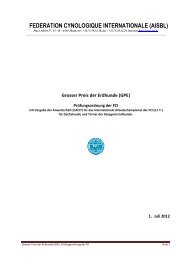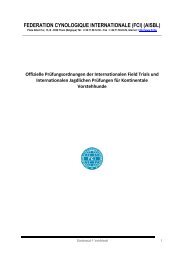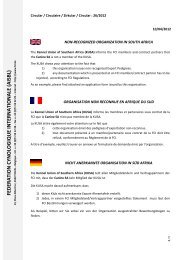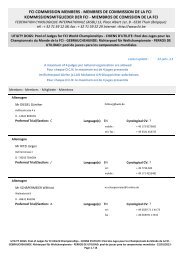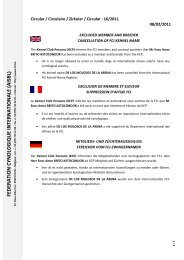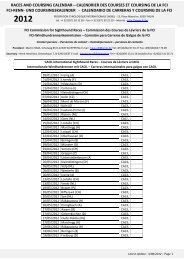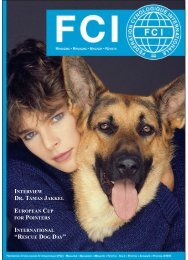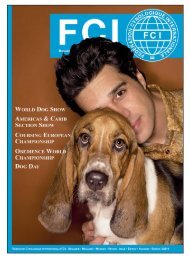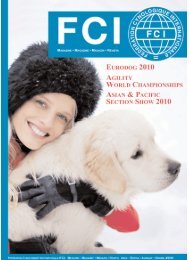MAGAZINE • MAGAZINE • MAGAZIN • REVISTA - FCI
MAGAZINE • MAGAZINE • MAGAZIN • REVISTA - FCI
MAGAZINE • MAGAZINE • MAGAZIN • REVISTA - FCI
You also want an ePaper? Increase the reach of your titles
YUMPU automatically turns print PDFs into web optimized ePapers that Google loves.
dards and regulations, goes<br />
without saying.<br />
In the show sector, there has also<br />
been another positive development.<br />
The increase by nearly<br />
10% of the number of CACIB<br />
shows which, in many cases,<br />
have also been achieving new<br />
registration records, is good<br />
news. The mobility of the exhibitors<br />
last year was certainly<br />
not reduced and in particular<br />
there were Russian participants<br />
to be found at almost every<br />
event. It also bears mentioning<br />
that the number of winning <strong>FCI</strong><br />
dogs, including at organisations<br />
which do not belong to the <strong>FCI</strong>,<br />
e.g. England, is constantly rising.<br />
The end of the cynological<br />
isolation of an important part of<br />
Europe would also provide a<br />
new stimulus to dog breeding<br />
and to the show and trial sectors.<br />
A collaboration which<br />
both takes into consideration<br />
and also respects the different<br />
developments can give a boost<br />
to working together in Europe.<br />
If we assume that the quantitative<br />
development of all the<br />
cynological activities is dependent<br />
on breeding frequencies,<br />
then the number of registered<br />
<strong>FCI</strong> kennels is definitely<br />
of significance.<br />
From 2007 to 2008 there was a<br />
reduction of new kennel registrations<br />
by 2,680. It does not<br />
necessarily follow that there<br />
will be a smaller number of<br />
puppy registrations in consequence.<br />
Larger breeding units,<br />
a higher degree of professionalisation,<br />
but also the selection<br />
of breeds, which has repercussions<br />
on the size of the litters,<br />
could have a compensating effect.<br />
Indeed a significant increase in<br />
the amount of legal protection<br />
for kennel names can be observed<br />
in certain organisations.<br />
Brazil, Chile, Switzerland but<br />
above all Sweden and France<br />
must be mentioned here. There<br />
was a dramatic slump in Japan<br />
on the other hand, where numbers<br />
went down by half from<br />
2005 (13,263) to 2008 (6,584).<br />
Despite that, the JKC is the organisation<br />
with the most registrations<br />
within the <strong>FCI</strong>. However,<br />
with 465,000 puppies,<br />
only 109 CIB could be<br />
achieved. In this respect too,<br />
the high export numbers seem<br />
to be the crucial factor.<br />
doit aller de pair avec un respect<br />
plus strict de nos standards<br />
et de nos règlements.<br />
Il convient de mentionner un<br />
point positif en matière d'expositions<br />
: nous pouvons en effet<br />
nous réjouir de l'augmentation<br />
de près de 10% du nombre<br />
d'expositions à CACIB. Cette<br />
hausse s'accompagne, dans de<br />
nombreux cas, de nouveaux records<br />
en termes de participation.<br />
La mobilité des exposants<br />
n'a pas diminué l'an dernier ; on<br />
rencontre notamment des participants<br />
russes à pratiquement<br />
chaque grand événement. Nous<br />
remarquons également que le<br />
nombre de chiens remportant<br />
des prix lors de manifestations<br />
tenues en dehors de la <strong>FCI</strong>, en<br />
Angleterre par exemple, est en<br />
constante augmentation. La fin<br />
de l'isolement cynologique d'une<br />
partie significative de l'Europe<br />
éveillera un nouvel intérêt<br />
pour l'élevage canin ainsi que<br />
pour les expositions et les diverses<br />
épreuves de travail et de<br />
chasse. Prendre en considération<br />
et respecter une évolution<br />
différente ensemble peut donner<br />
une impulsion positive à la<br />
collaboration en Europe.<br />
Si l'on tient compte du fait que<br />
le développement quantitatif de<br />
l'ensemble des activités cynologiques<br />
dépend de l'intensité de<br />
l'élevage, le nombre d'affixes<br />
enregistrés auprès de la <strong>FCI</strong><br />
peut être considéré comme<br />
révélateur.<br />
De 2007 à 2008, la <strong>FCI</strong> a enregistré<br />
une baisse de 2.680 affixes,<br />
toutefois, cela ne doit pas<br />
avoir nécessairement pour<br />
conséquence une baisse des inscriptions<br />
dans les livres d'origines.<br />
Des élevages plus importants,<br />
un professionnalisme plus<br />
marqué ainsi que le choix des<br />
races élevées (qui a une incidence<br />
sur la taille de la portée)<br />
peuvent créer un certain équilibre.<br />
Dans de nombreux pays, on remarque<br />
néanmoins une nette<br />
augmentation du nombre de demandes<br />
d'enregistrements d'affixes.<br />
Nous pensons au Brésil,<br />
au Chili, à la Suisse, mais surtout<br />
à la Suède et à la France -<br />
avec toutefois un recul impressionnant<br />
du Japon où les chiffres<br />
ont diminué de moitié de<br />
2005 (13.263) à 2008 (6.584).<br />
Le JKC reste néanmoins l'organisation<br />
comptant le plus grand<br />
nombre d'inscriptions dans ses<br />
livres des origines au sein de la<br />
<strong>FCI</strong>. FOR DOGS WORLDWIDE.<br />
intensivere Beachtung unserer<br />
Standards und Reglements<br />
verbunden sein muss, ist wohl<br />
selbstverständlich.<br />
Im Ausstellungsbereich ist eine<br />
weitere positive Entwicklung<br />
aufzuzeigen. Eine Steigerung<br />
der CACIB-Shows um nahezu<br />
10 %, die auch in vielen Fällen<br />
neue Melderekorde erreichen,<br />
ist erfreulich. Die Mobilität der<br />
Aussteller nahm im vergangenen<br />
Jahr nicht ab, vor allem<br />
russische Teilnehmer trifft man<br />
bei fast jeder großen Veranstaltung.<br />
Zu erwähnen ist auch,<br />
dass die Zahl der <strong>FCI</strong>-Siegerhunde<br />
auch bei Organisatoren,<br />
die nicht der <strong>FCI</strong> angehören<br />
wie z.B. England, stetig steigt.<br />
Das Ende der kynologischen<br />
Isolation eines bedeutenden<br />
Teiles Europas wird auch der<br />
Hundezucht, dem Ausstellungsund<br />
Prüfungsbereich neue Anreize<br />
geben. Ein Miteinander<br />
unter Berücksichtigung und<br />
Respektierung der unterschiedlichen<br />
Entwicklung kann der<br />
Zusammenarbeit in Europa<br />
positive Impulse geben.<br />
Wenn man davon ausgeht, dass<br />
die quantitative Entwicklung<br />
aller kynologischen Aktivitäten<br />
von der Zuchtfrequenz abhängig<br />
ist, kann der Anzahl der angemeldeten<br />
<strong>FCI</strong>-Zuchtstätten<br />
eine Aussagekraft gegeben<br />
werden.<br />
Von 2007 auf 2008 ergab sich<br />
eine Verringerung um 2.680<br />
neuer Registrierungen. Das<br />
muss nicht unbedingt eine geringere<br />
Eintragungszahl zur<br />
Folge haben. Größere Zuchteinheiten,<br />
mehr Professionalisierung,<br />
aber auch die Rasseauswahl,<br />
die Auswirkung auf<br />
die Wurfgröße mit sich bringt,<br />
können ausgleichend wirken.<br />
Tatsächlich kann in einigen Organisationen<br />
eine deutliche<br />
Steigerung des Zwingernamenschutzes<br />
beobachtet werden.<br />
Brasilien, Chile, Schweiz, vor<br />
allem aber Schweden und<br />
Frankreich sind hier zu erwähnen.<br />
Ein dramatischer Einbruch<br />
hingegen in Japan, wo sich die<br />
Anzahl von 2005 (13.263) bis<br />
2008 (6.584) halbierte. Trotzdem<br />
ist der JKC die Organisation<br />
mit den meisten Eintragungen<br />
innerhalb der <strong>FCI</strong>. Mit<br />
465.000 Welpen konnten allerdings<br />
nur 109 CIB erreicht<br />
werden. Auch dafür scheint die<br />
hohe Exportquote ausschlaggebend<br />
sein.<br />
influyan positivamente en el<br />
subsiguiente desarrollo cinológico.<br />
Naturalmente esto significa<br />
que los estándares y reglamentos<br />
se deberán observar y<br />
cumplir con aún más exactitud.<br />
En el sector de las exposiciones<br />
cabe destacar otro desarrollo<br />
positivo más. Nos alegra ver<br />
que los shows de CACIB han<br />
aumentado casi un 10 %, registrándose<br />
en muchos casos incluso<br />
nuevos récords de inscripciones.<br />
La movilidad de los<br />
expositores no disminuyó el<br />
año pasado. En casi todos los<br />
grandes eventos se pueden encontrar<br />
sobre todo a los participantes<br />
rusos. También cabe<br />
mencionar que el número de<br />
perros ganadores de la <strong>FCI</strong> aumenta<br />
constantemente, incluso<br />
en países organizadores que no<br />
forman parte de la <strong>FCI</strong>, como<br />
por ejemplo Inglaterra. El fin<br />
del aislamiento cinológico de<br />
una parte importante de Europa<br />
ofrecerá nuevos estímulos e incentivos,<br />
también a la cría de<br />
perros, al sector de las exposiciones<br />
y al sector de las pruebas.<br />
El trabajo conjunto observando<br />
y respetando los diferentes<br />
desarrollos puede estimular<br />
positivamente la cooperación<br />
en Europa.<br />
Si partimos de la base de que el<br />
desarrollo cuantitativo de todas<br />
las actividades cinológicas depende<br />
de la intensidad y frecuencia<br />
de la cría, el número<br />
registrado de centros de cría de<br />
la <strong>FCI</strong> ciertamente tiene un<br />
valor informativo.<br />
De 2007 a 2008 se produjo una<br />
disminución a 2.680 registros<br />
nuevos. Esto no significa necesariamente<br />
que se reduzca<br />
también el número de perros<br />
inscritos. El hecho de que se<br />
pueda tratar de centros de cría<br />
más grandes, el aumento de la<br />
profesionalidad, pero también<br />
la selección de razas, que<br />
influye en el tamaño de las camadas,<br />
pueden tener un efecto<br />
de compensación.<br />
De hecho, en algunas organizaciones<br />
se pueden observar un<br />
aumento claro de la protección<br />
de afijos. Cabe mencionar al<br />
respecto al Brasil, Chile, Suiza<br />
y, sobre todo, Suecia y Francia.<br />
Un descenso dramático, sin embargo,<br />
se ha producido en Japón,<br />
en donde el número se ha<br />
reducido a la mitad entre el año<br />
2005 (13.263) y el año 2008<br />
(6.584). A pesar de ello, el JKC<br />
es la organización con el mayor<br />
número de inscripciones de la<br />
<strong>FCI</strong>. Con 465.000 cachorros,<br />
21



